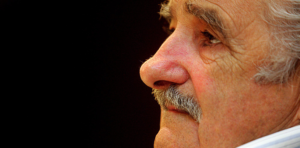
Nothing is surprising in Uruguay these days.
In years past, it would have been unthinkable for a vice president who is nothing but a vile liar to remain in office. It would also have been unthinkable that Eduardo Bonomi, who is probably the most inept minister in the country’s history, could stay in command of the Ministry of Interior.
But Uruguay is not what it used to be, and so we simply can’t afford to be that surprised anymore.
In this version of Uruguay, the artist Julio de Sosa painted former president and current Senator José “Pepe” Mujica and his wife, Senator Lucía Topolansky, naked, in the form of Adam and Eve — calling the work Uruguay’s Genesis.
Mujica and his wife censored the painting, despite it supposedly being an alleged tribute to the couple. The police showed up — without a warrant, according to local media — at the art gallery where the work was displayed, and removed it.
It seems that the progressive populism the former president has always proposed requires a return to the Middle Ages, or some other ancient time period when nudity is considered a source of shame and condemnation.
In this case, though, it is the self-proclaimed “progressivism” that is being shown naked as it is: arrogant, tyrannical and troglodyte.
But few have realized the seriousness of this matter. Uruguayans have taken the “naked Mujica and Topolansky” issue as a joke rather than what it really is: pure censorship — the same kind progressives claim to condemn, and which has always been associated with dictatorships.
If a “right-wing” government would have dared to do such a thing, cries would have been heard around the world.
The government has demonstrated time and again that it does not practice what it preaches — and that what it preaches is contradictory anyway.
Diana Saravia, head of the gallery where the painting was exposed, posted on her Facebook page:
… The highly controversial work of artist Julio de Sosa, Uruguay’s Genesis, exhibited in our gallery, was removed from the wall. Yesterday, two policemen kindly visited us to deliver a gentle summons to testify at the police station, and asked us to withdraw the painting from public view.
Everyone knows I’m a public, hardworking and honest person, and I fight every day to promote and keep active a small portion of our national artistic production. I try to give emerging artists a chance with lesser-known works, which may not please everyone and perhaps are not so perfect, but I look for something different in them.
In this case, I saw a share of humor in the painting of this young artist. In times of “drought,” in times of crisis, in times when the desire to buy or appreciate art is suppressed, it’s necessary.
Support for artistic expression is necessary, and it is necessary to be free to express it. Art is free, and I think it is not right to condemn it.
In such an small country like this one, the cultural benefit would have been immense. Thousands of people in one way or another express themselves through some artistic discipline. No one … is thinking about injuring or annoying anyone; what we do is for the love of art, and we love to do it.
Never in a democracy has an artist been forced to testify at the police station because of a work of art. But we should no longer be surprised when we’re talking about the Uruguay of today.
 Versión Español
Versión Español












